Thursday’s Post-Publication Post: New Project, Old Questions
Last week, by sheer force of discipline, I managed to start my day earlier and NOT fritter away the extra time working on this blog, catching up on Facebook or Twitter, or indulging in any one of a number of other distractions. What did I do with this “extra” time?
Reader, I wrote. Even more wonderful, I wrote fiction.
Over the course of a few days, I wrote what could be a short story. Or it could be an opening chapter in a novel. Or perhaps it will end up as one of several “linked” stories in another collection (the characters and their histories are very closely related, if not identical to a few characters in some published stories that I did not include in my first collection, Quiet Americans).
These uncertainties–Am I beginning a novel? Am I writing a discrete story?–are familiar. At least, they’re familiar to me.
True, sometimes the work’s form seems utterly clear right from the start. The day in July 1996 when I discovered the archival documents that inspired my (agented-though-unpublished) novel, The Haguenauer Line, I recognized at once that I’d found the seeds of a novel. Several of the stories in Quiet Americans–“Floating” and “The Quiet American, Or How to Be a Good Guest,” for example–always seemed destined to grow into and be published in story form.
But for a long time, I thought–yes, I hoped–that the book’s closing story, “Mishpocha,” would turn into a novel. And given that a few of the other stories feature some of the same characters, I’ve been asked if I considered novelizing their storylines and/or writing a full-fledged book of linked stories in which those characters would provide the connective tissue.
For me, finding the “right” fictional form sometimes presents real challenges and can take a long time. I’ve long wondered how other writers make these decisions (or if they find there are even decisions to be made). I’m still wondering, and I’d love to hear what other practicing fictionists have to say.
